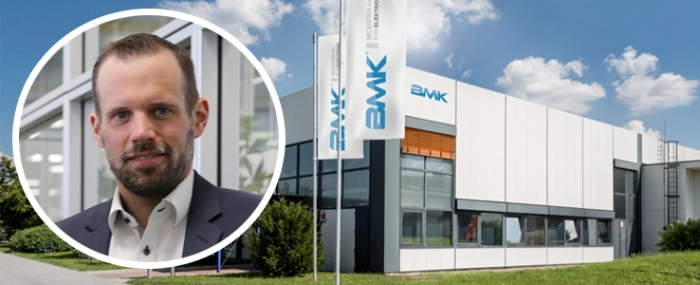
© BMK
Electronics Production |
Evertiq’s industry pulse report – BMK
German EMS provider, BMK, attributes the company's ability to cope with difficult situations to the persistent will and flexibility of its employees. It’s not “higher, faster, further”, but rather “higher, faster, further together” that has pushed the company forward during the pandemic.
In this article series, Evertiq has reached out to a number of European EMS providers to see how the challenges from the last two years have affected everyday operations. This time we will hear from Andreas Schneider, Sales Director at BMK.
Given the fact that we have battled the pandemic for close to two years now, what lessons have been learned and what changes have been made in your company?
“The pandemic crisis has further strengthened the unity within the company. We are particularly pleased that all employees pulled together and demonstrated flexibility, even under heavy stress. Our customers tell us that we are on the right course in this crisis. BMK has always relied on partnerships of equal footing. In such special times we can only survive together. Not “higher, faster, further” but “higher, faster, further together”. We embody this, both internally and externally. As a medium-sized company, we are a partner for medium-sized companies, in order to develop individual concepts and solutions together with our customers.”
“The flexibility of our production helped and helps enormously when it comes to coping with the crisis. The challenges are, on the one hand, the issues surrounding material availability, and on the other hand, the pandemic which has affected individual industries differently. Orders are changed at short notice, which means that expenses increase. Our optimized, and partly digitised, processes work: From purchasing, to securing the supply chain, to production. All with flexible adjustments to produce orders from batch size 1, to fast after-sales service. Not to mention the logistics. At BMK, an independent team is dedicated to this area in order to reliably organise transports by sea, air and land, especially in times of pandemic.”
As soon as we entered 2021, it became very clear that the pandemic isn’t the only problem weighing down on the industry, the shortage of components have greatly affected our industry and adjacent ones, how is your company working to overcome the issues of tight supply?
“BMK can deal with a crisis. We have been responding to the situation since the summer of last year. Our long-term manufacturing and supplier strategies have helped us to continue moving forward. Due to the close connection and direct channels to our suppliers and customers, we are quick to react so that we can adjust to the constant changes. Our purchasing department is divided into strategic purchasing, which operates from our main location, and operational purchasing, which are located in the individual business units. Our employees at the local purchasing office in China have a direct line to the Asian manufacturers, which speeds up the purchasing process and logistics enormously.”
“But despite everything, the situation remains very challenging for us and our industry. Current orders are organised, but difficulties remain, especially for new projects, as 2022 will hold similar challenges.”
As a European manufacturer, what is your opinion on the fact that the European electronics industry is still very much dependent on Asia in terms of semiconductor supplies?
“The topic caught up with us during the last allocation, but the fact is that we are dependent on Asia. And this dependency does not only affect the electronics industry. Europe has made itself dependent in many areas by relocating entire branches of certain industries. The aim must be to strengthen the entire value chain of the electronics industry in Europe. Regrettably, when the orders are placed, the focus is most often on costs. However, this is currently being reevaluated so that in addition to costs, other factors such as proximity, quality and flexibility are crucial for reliable order fulfillment. This is where the opportunity lies for Europe. Allocation and the pandemic are accelerators in this.”
Has the pandemic highlighted the need for closer and smaller supply chains in your opinion?
“Absolutely. Europe must try to keep at least a minimum of production possibilities as well as the know-how in key technologies in order to be able to react more quickly to emergencies. The argument of cost has to take the back seat due to the massive disruptions in supply a crisis can have. With excellently trained experts, stable and secure logistics, characterized by short distances that allow more flexibility and are thus more sustainable, Europe should present itself more confidently to the world.”
The United States, in particular, is looking to jump-start the development of new chip factories throughout the country in order to reduce its dependency on China. Should Europe as a collective also take a similar approach?
“Yes, but not only focused on chip production. If we disregard the other components of the industry, well then we have chips, but still no finished assemblies because the other parts or the raw materials for them are missing. A global strategy is needed across the entire supply chain, right down to the raw materials, that prevents us from being dependent on one country or region.”
What is the general feeling now that we are drawing close to the end of 2021 and approaching 2022?
“An exhausting year lies behind us, an equally exhausting one ahead of us. BMK has a very good order situation and the challenge will rather be how to ensure the availability of materials so that we can continue to deliver to our costumers.”
“We are doing everything we can to protect and support our employees in order to jointly make a difference for our customers: to navigate through the pandemic in a targeted manner. Our sleeves stay rolled up.”

